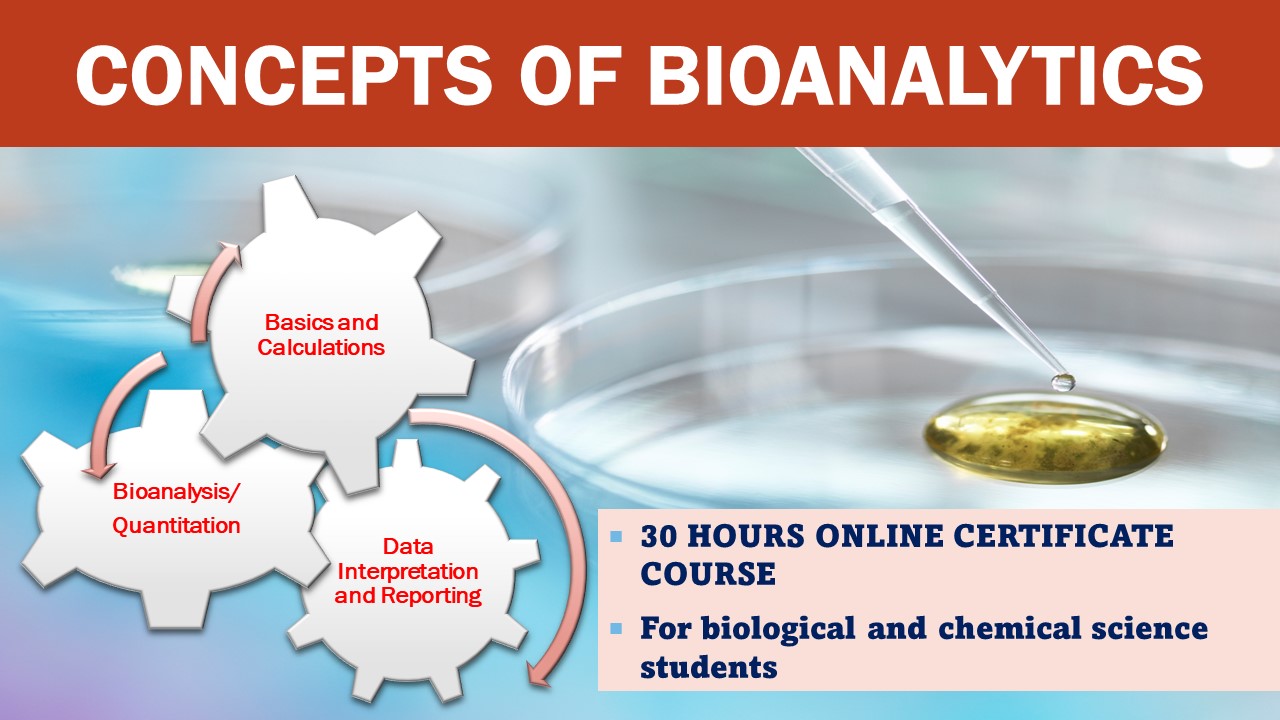23017_Concepts of Bioanalytics

About Course
Duration: 30 Hours
Objective
The objective of this course is to empower students of biology and chemistry with in-dept understanding of basic concepts that form the foundation of any qualitative or quantitative analytical/bioanalytical study.
Course Outcomes
Upon completion of this course, students will be able to
- Explain the concepts related to pH, concentration, and units
- Perform calculations to prepare various solutions used in Bioanalytics
- Design and perform quantitative experiments.
- Analyse and present experimental data
Syllabus
- UNIT I – Basics for Quantitative Bioanalysis
- Introduction
- Safe Laboratory Practices
- Density, specific gravity, and percent composition
- Units, and Interconversion
- Molarity and Normality
- Acids and bases and Acid- Base Properties of amino acids, pI
- pH, pKa and Henderson–Hasselbalch equation
- pH meter and preparation of Biological Buffers
UNIT II – Quantitation
- Concentration terms
- Inter conversion of concentration terms
- Dilution
- Units of Biomolecules
- Titration
- Spectrophotometric quantitation. Proteins, DNA and RNA
- Using Extinction coefficient in bioassays (NAD/NADH)
- DNA- melting curve analysis
UNIT III – Analysis, Interpretation and Presentation of Data
- Preparation of calibration curve and calculation of results
- Graphs- linear, logarithmic, and exponential
- LD50, ED50 and IC50 calculations
- LOD and LOQ
- Mean, SD, SEM, CV
- Presentation of Experimental Data
Course Content
UNIT I – Basics for Quantitative Bioanalysis
-
Introduction
00:00 -
Safe Laboratory Practices
00:00 -
Part I – Density, Specific gravity and Percent Composition
00:00 -
Part II – Density, Specific gravity and Percent Composition
00:00 -
Part I- Units and Interconversion of Units
00:00 -
Part II- Units and Interconversion of Units
00:00 -
Part III Units and Interconversion of units
00:00 -
Molarity and Normality
00:00 -
Part I-Acids and bases and Acid- Base Properties of amino acids
00:00 -
Part II-Acids and bases and Acid- Base Properties of amino acids
00:00 -
Part III-Acids and bases and Acid- Base Properties of amino acids
00:00 -
Part I – pH meter and Preparation of Biological Buffers
00:00 -
Part II-pH, pKa and Henderson–Hasselbalch equation
00:00 -
Part III-pH, pKa and Henderson–Hasselbalch equation
00:00 -
Part I-pH, pKa and Henderson–Hasselbalch equation
00:00 -
Part II – pH meter and Preparation of Biological Buffers
00:00 -
Part III – pH meter and Preparation of Biological Buffers
00:00 -
Time (3hrs)
UNIT II-Quantitation
UNIT III : Analysis, Interpretation and Presentation of Data
Student Ratings & Reviews

No Review Yet